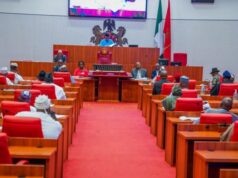The Federal Inland Revenue Service (FIRS) says it will introduce the FIRS e-Invoice, a digital solution for managing invoices, in line with the Tax Administration and Enforcement Act 2007.
The FIRS Chairman, Dr Zacchaeus Adedeji, made this known at the LCCI-FIRS Organised Private Sector Stakeholders Engagement in Lagos on Wednesday, September 18, 2024.
Adedeji, who was represented by the Acting Director of Medium Taxpayers Department, FIRS, Oti Olaniyi, said the e-invoice was necessary as the country moved forward to innovate and enhance its tax system.
He said the initiative, as part of the service’s digital transformation strategy, would facilitate real-time transaction validation and storage, benefiting business-to-business, business-to-consumer and business-to-government transactions.
Adedeji noted that the emerging tax matters in Nigeria presented both challenges and opportunities.
The FIRS boss said significant developments such as the recent organisational restructuring of the FIRS and other tax reforms had taken place in the taxation landscape.
He added that Nigeria could develop a tax system that would support sustainable growth and equitable development by embracing reforms, leveraging technology and ensuring transparency.
Bill Gates: Tax collection in Nigeria too low
Adedeji said: “Our collective efforts will pave the way for a more prosperous and resilient Nigeria.
“As we move forward, we encourage you to support these initiatives with constructive feedback and collaboration.
“By doing so, we can all build a stronger, more resilient economy that benefits everyone.”
Adedeji also stated that the country which had gotten to a crucial juncture in its economic evolution must explore various tax incentives to stimulate local industries.
He emphasised the need for transparency and effectiveness in the implementation of these incentives and evaluation of their impact by ensuring they aligned with national development goals.
In his remarks, The LCCI President, Gabriel Idahosa, urged the FIRS to collaborate with the private sector and the government to ensure that tax policies support business innovation and competitiveness.
Idahosa noted that recently, Nigeria’s tax system had undergone significant transformations driven by reforms and policy changes to boost revenue, simplify compliance, and address critical fiscal challenges.
- Pro-Biafran agitator Simon Ekpa arrested in Finland - November 21, 2024
- Senate approves Tinubu’s request for $2.2bn loan - November 21, 2024
- Magistrates, judicial officers suspended for corruption, drunkenness - November 21, 2024










